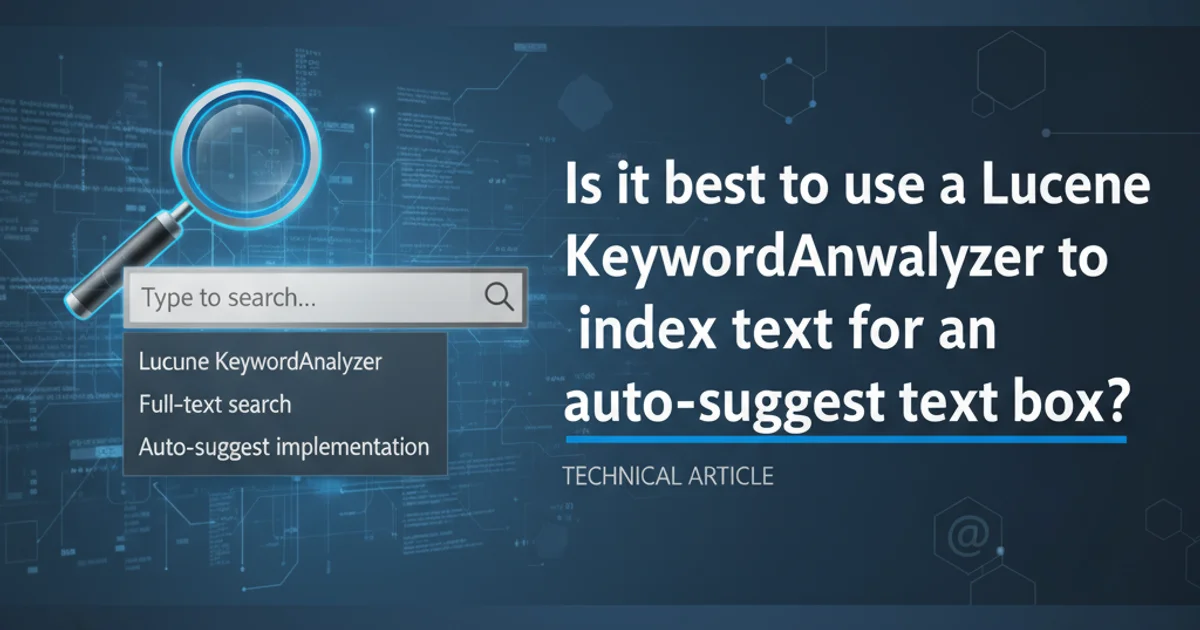Is it best to use a lucene KeywordAnalyzer to index text for an auto-suggest text box?
Categories:
Optimizing Auto-Suggest with Lucene: KeywordAnalyzer vs. Text Analysis

Explore the best Lucene indexing strategies for auto-suggest text boxes, comparing KeywordAnalyzer with more advanced text analysis techniques to achieve optimal search results.
When building an auto-suggest or autocomplete feature with Lucene, a common question arises: should you use a KeywordAnalyzer to index your text? While KeywordAnalyzer might seem intuitive for exact matches, its suitability for auto-suggest depends heavily on your specific requirements and the nature of the data you're indexing. This article will delve into the nuances of using KeywordAnalyzer versus more sophisticated analysis chains for auto-suggest functionality in Lucene.NET and Lucene.
Understanding KeywordAnalyzer in Lucene
The KeywordAnalyzer in Lucene treats the entire input string as a single token. It does not perform any tokenization, stemming, lowercasing, or stop word removal. This means that if you index "Apple iPhone" using KeywordAnalyzer, it will be stored as a single token: "Apple iPhone".
This behavior is ideal for fields where you need exact, case-sensitive matches, such as product IDs, SKUs, or specific tags that should not be broken down. However, for auto-suggest, where users might type partial words, misspellings, or different casing, KeywordAnalyzer often falls short.
flowchart TD
A["User Input: 'appl'"] --> B{"Index with KeywordAnalyzer?"}
B -- Yes --> C["Indexed Term: 'Apple iPhone'"]
C -- No Match --> D["Search Result: None"]
B -- No --> E["Indexed Term: 'apple', 'iphone'"]
E -- Match --> F["Search Result: 'Apple iPhone'"]Comparison of KeywordAnalyzer vs. Tokenized Indexing for Auto-Suggest
Why KeywordAnalyzer is Generally Not Ideal for Auto-Suggest
For a typical auto-suggest scenario, users expect suggestions even if they've only typed a few characters of a word, or if their input doesn't exactly match the beginning of a stored phrase. KeywordAnalyzer prevents this by treating the entire field as an atomic unit. If a user types "app", and your indexed term is "Apple iPhone", KeywordAnalyzer will not find a match because "app" is not an exact match for "Apple iPhone".
Consider these limitations:
- Partial Matches: No support for partial word matches (e.g., typing "mic" to find "Microsoft").
- Case Sensitivity: By default, it's case-sensitive, meaning "apple" won't match "Apple iPhone" unless you explicitly lowercase during indexing and querying.
- Phrase Matching: It's good for exact phrase matching, but not for suggesting phrases based on individual words within them.
- Typo Tolerance: Offers no inherent typo correction or fuzzy matching capabilities.
KeywordAnalyzer is generally not recommended for the primary auto-suggest field, it can be useful for a separate field in your document that stores the exact, original phrase for display purposes, or for very specific filtering needs.Recommended Approach: N-Gram and Edge N-Gram Tokenizers
For robust auto-suggest functionality, you typically need to break down your text into smaller, searchable units. The most effective approach involves using EdgeNGramTokenFilter or NGramTokenFilter in conjunction with other filters like LowerCaseFilter.
An EdgeNGramTokenFilter generates tokens from the beginning of a word up to a certain length. For example, "Apple" with minGram=1, maxGram=3 would produce "A", "Ap", "App". This allows partial matches from the start of words.
An NGramTokenFilter generates tokens from anywhere within a word. For "Apple" with minGram=2, maxGram=3, it would produce "Ap", "App", "pp", "ppl", "pl", "ple", "le". This is useful for matching within words, but can generate a very large index.
Here's a common analysis chain for auto-suggest:
- Tokenizer:
StandardTokenizer(breaks text into words). - Filter:
LowerCaseFilter(handles case insensitivity). - Filter:
StopFilter(optional, removes common words like "the", "a"). - Filter:
EdgeNGramTokenFilter(generates partial word tokens).
This setup allows a user typing "iph" to match "iPhone" because "iph" would be an indexed n-gram of "iPhone".
using Lucene.Net.Analysis;
using Lucene.Net.Analysis.Standard;
using Lucene.Net.Analysis.NGram;
using Lucene.Net.Util;
public class AutoSuggestAnalyzer : Analyzer
{
private readonly LuceneVersion _matchVersion;
private readonly int _minGram;
private readonly int _maxGram;
public AutoSuggestAnalyzer(LuceneVersion matchVersion, int minGram, int maxGram)
{
_matchVersion = matchVersion;
_minGram = minGram;
_maxGram = maxGram;
}
protected override TokenStreamComponents CreateComponents(string fieldName, TextReader reader)
{
Tokenizer source = new StandardTokenizer(_matchVersion, reader);
TokenStream result = new LowerCaseFilter(_matchVersion, source);
result = new EdgeNGramTokenFilter(_matchVersion, result, _minGram, _maxGram);
return new TokenStreamComponents(source, result);
}
}
Custom Lucene.NET Analyzer for Auto-Suggest using EdgeNGramTokenFilter
minGram and maxGram values for EdgeNGramTokenFilter. Too small a minGram (e.g., 1) can lead to a very large index, while too large a maxGram might not cover all desired partial matches. A common range is minGram=2 and maxGram=15.By using an analyzer like the one above, when you index a term like "Apple iPhone", the following tokens might be generated and indexed (assuming minGram=2, maxGram=15):
ap,app,appl,appleip,iph,ipho,iphon,iphone
This allows a user typing "app" or "iph" to find the document containing "Apple iPhone".